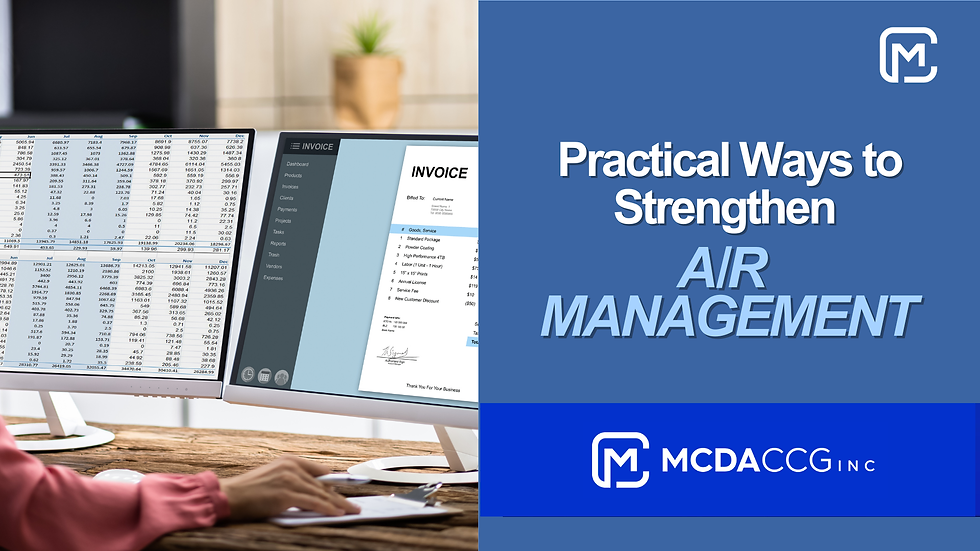Is Your Payroll Compliant with the Latest Tax Regulations?
- MCDA CCG, Inc.

- Jul 18, 2025
- 3 min read
What every business owner needs to know to stay on the right side of the law—and avoid costly penalties.
Payroll might not be the most glamorous part of running a business, but it’s absolutely essential—and complex. Beyond just paying your employees on time, payroll compliance means making sure you’re following all the latest tax regulations, reporting requirements, and recordkeeping rules.
Why? Because non-compliance can lead to fines, audits, and even legal trouble. If you’re unsure whether your payroll processes are up to date, you’re not alone. Tax laws and labor regulations change regularly, and staying current takes attention and care.
Let’s break down what payroll compliance means today—and how you can ensure your business is in good shape.
What Does Payroll Compliance Actually Mean?
Payroll compliance refers to meeting all federal, state, and local laws related to employee compensation, tax withholding, reporting, and recordkeeping.
At a minimum, this includes:
Accurately calculating employee wages, including overtime
Withholding the correct amounts for federal, state, and local taxes
Timely depositing payroll taxes to the IRS and relevant agencies
Filing required payroll tax returns (like Form 941 or 940)
Providing employees with accurate wage statements (W-2s and pay stubs)
Keeping detailed payroll records for several years
Failing to do any of these can trigger IRS penalties or labor law violations. According to the IRS, penalties for payroll tax noncompliance can range from thousands to tens of thousands of dollars—and in severe cases, criminal charges.
What Are Some Recent Changes to Payroll Tax Regulations?
Tax and labor agencies frequently update rules. Here are some key changes business owners should know about in 2025:
1. Updated Federal Tax Rates and Withholding Tables
The IRS updates tax brackets and withholding tables annually. Using outdated tables can cause incorrect tax withholdings. The IRS released new Publication 15-T for 2025, outlining these changes.
2. New Reporting Requirements for Gig and Contract Workers
The IRS is increasing scrutiny on payments to independent contractors, making Form 1099-NEC reporting more critical than ever. Make sure you collect accurate W-9 forms and report all qualifying payments.
3. Minimum Wage Increases in Several States
As of 2025, states like California, New York, and Florida have raised their minimum wages. Complying means updating payroll systems to reflect these changes and properly calculating overtime pay.
4. Expanded Paid Family and Medical Leave Laws
Several states have introduced or expanded paid family leave programs, requiring employers to withhold additional payroll taxes or contribute to state funds.
5. Electronic Filing and Payment Deadlines
The IRS increasingly encourages (and in some cases requires) electronic filing and electronic federal tax deposits (EFTPS). Late or paper filings can cause delays and penalties.
How to Make Sure Your Payroll Is Compliant
Stay Informed and EducatedCheck the IRS website regularly and subscribe to updates from your state labor department. Tax laws evolve, and so should your payroll practices.
Use Reliable Payroll Software or ServicesModern payroll platforms like Gusto, QuickBooks Payroll, and ADP automatically update tax tables and filing requirements, reducing human error.
Keep Accurate RecordsMaintain detailed records of wages, hours worked, tax withholdings, deposits, and filings for at least four years (IRS recommendation).
Work With ProfessionalsConsider partnering with a certified accountant or payroll specialist, especially if your business is growing or you have employees in multiple states.
Audit Your Payroll RegularlyConduct internal reviews or hire an external auditor to catch mistakes before they become costly problems.
Why Payroll Compliance Matters Beyond Penalties
Compliant payroll processes help build trust with your employees, reduce stress during tax season, and ensure your business can grow sustainably.
In contrast, payroll mistakes or delays can harm employee morale, invite government scrutiny, and even trigger lawsuits.
Final Thought: Don’t Let Payroll Slip Through the Cracks
Payroll compliance might not be the flashiest part of business management, but it’s foundational. By keeping up with the latest tax regulations, using reliable tools, and seeking expert help when needed, you’ll keep your business—and your people—on solid ground.
If you want, I can share a checklist or resources to help you review your current payroll process.



Comments